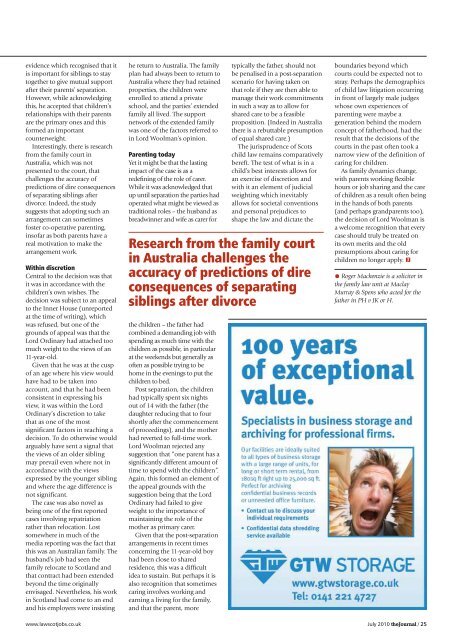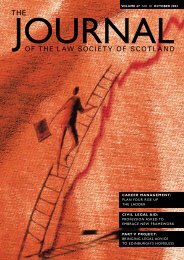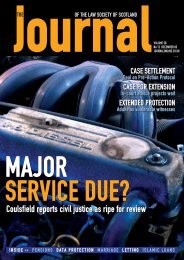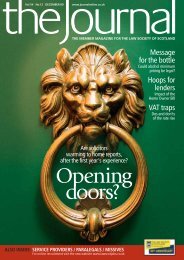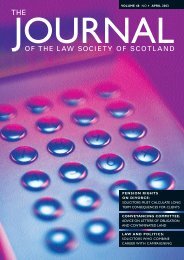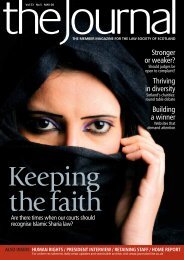Professional briefing - The Journal Online
Professional briefing - The Journal Online
Professional briefing - The Journal Online
You also want an ePaper? Increase the reach of your titles
YUMPU automatically turns print PDFs into web optimized ePapers that Google loves.
evidence which recognised that it<br />
is important for siblings to stay<br />
together to give mutual support<br />
after their parents’ separation.<br />
However, while acknowledging<br />
this, he accepted that children’s<br />
relationships with their parents<br />
are the primary ones and this<br />
formed an important<br />
counterweight.<br />
Interestingly, there is research<br />
from the family court in<br />
Australia, which was not<br />
presented to the court, that<br />
challenges the accuracy of<br />
predictions of dire consequences<br />
of separating siblings after<br />
divorce. Indeed, the study<br />
suggests that adopting such an<br />
arrangement can sometimes<br />
foster co-operative parenting,<br />
insofar as both parents have a<br />
real motivation to make the<br />
arrangement work.<br />
Within discretion<br />
Central to the decision was that<br />
it was in accordance with the<br />
children’s own wishes. <strong>The</strong><br />
decision was subject to an appeal<br />
to the Inner House (unreported<br />
at the time of writing), which<br />
was refused, but one of the<br />
grounds of appeal was that the<br />
Lord Ordinary had attached too<br />
much weight to the views of an<br />
11-year-old.<br />
Given that he was at the cusp<br />
of an age where his view would<br />
have had to be taken into<br />
account, and that he had been<br />
consistent in expressing his<br />
view, it was within the Lord<br />
Ordinary’s discretion to take<br />
that as one of the most<br />
significant factors in reaching a<br />
decision. To do otherwise would<br />
arguably have sent a signal that<br />
the views of an older sibling<br />
may prevail even where not in<br />
accordance with the views<br />
expressed by the younger sibling<br />
and where the age difference is<br />
not significant.<br />
<strong>The</strong> case was also novel as<br />
being one of the first reported<br />
cases involving repatriation<br />
rather than relocation. Lost<br />
somewhere in much of the<br />
media reporting was the fact that<br />
this was an Australian family. <strong>The</strong><br />
husband’s job had seen the<br />
family relocate to Scotland and<br />
that contract had been extended<br />
beyond the time originally<br />
envisaged. Nevertheless, his work<br />
in Scotland had come to an end<br />
and his employers were insisting<br />
www.lawscotjobs.co.uk<br />
he return to Australia. <strong>The</strong> family<br />
plan had always been to return to<br />
Australia where they had retained<br />
properties, the children were<br />
enrolled to attend a private<br />
school, and the parties’ extended<br />
family all lived. <strong>The</strong> support<br />
network of the extended family<br />
was one of the factors referred to<br />
in Lord Woolman’s opinion.<br />
Parenting today<br />
Yet it might be that the lasting<br />
impact of the case is as a<br />
redefining of the role of carer.<br />
While it was acknowledged that<br />
up until separation the parties had<br />
operated what might be viewed as<br />
traditional roles – the husband as<br />
breadwinner and wife as carer for<br />
the children – the father had<br />
combined a demanding job with<br />
spending as much time with the<br />
children as possible, in particular<br />
at the weekends but generally as<br />
often as possible trying to be<br />
home in the evenings to put the<br />
children to bed.<br />
Post separation, the children<br />
had typically spent six nights<br />
out of 14 with the father (the<br />
daughter reducing that to four<br />
shortly after the commencement<br />
of proceedings), and the mother<br />
had reverted to full-time work.<br />
Lord Woolman rejected any<br />
suggestion that “one parent has a<br />
significantly different amount of<br />
time to spend with the children”.<br />
Again, this formed an element of<br />
the appeal grounds with the<br />
suggestion being that the Lord<br />
Ordinary had failed to give<br />
weight to the importance of<br />
maintaining the role of the<br />
mother as primary carer.<br />
Given that the post-separation<br />
arrangements in recent times<br />
concerning the 11-year-old boy<br />
had been close to shared<br />
residence, this was a difficult<br />
idea to sustain. But perhaps it is<br />
also recognition that sometimes<br />
caring involves working and<br />
earning a living for the family,<br />
and that the parent, more<br />
typically the father, should not<br />
be penalised in a post-separation<br />
scenario for having taken on<br />
that role if they are then able to<br />
manage their work commitments<br />
in such a way as to allow for<br />
shared care to be a feasible<br />
proposition. (Indeed in Australia<br />
there is a rebuttable presumption<br />
of equal shared care.)<br />
<strong>The</strong> jurisprudence of Scots<br />
child law remains comparatively<br />
bereft. <strong>The</strong> test of what is in a<br />
child’s best interests allows for<br />
an exercise of discretion and<br />
with it an element of judicial<br />
weighting which inevitably<br />
allows for societal conventions<br />
and personal prejudices to<br />
shape the law and dictate the<br />
Research from the family court<br />
in Australia challenges the<br />
accuracy of predictions of dire<br />
consequences of separating<br />
siblings after divorce<br />
boundaries beyond which<br />
courts could be expected not to<br />
stray. Perhaps the demographics<br />
of child law litigation occurring<br />
in front of largely male judges<br />
whose own experiences of<br />
parenting were maybe a<br />
generation behind the modern<br />
concept of fatherhood, had the<br />
result that the decisions of the<br />
courts in the past often took a<br />
narrow view of the definition of<br />
caring for children.<br />
As family dynamics change,<br />
with parents working flexible<br />
hours or job sharing and the care<br />
of children as a result often being<br />
in the hands of both parents<br />
(and perhaps grandparents too),<br />
the decision of Lord Woolman is<br />
a welcome recognition that every<br />
case should truly be treated on<br />
its own merits and the old<br />
presumptions about caring for<br />
children no longer apply.<br />
Roger Mackenzie is a solicitor in<br />
the family law unit at Maclay<br />
Murray & Spens who acted for the<br />
father in PH v JK or H.<br />
July 2010 the<strong>Journal</strong> / 25


